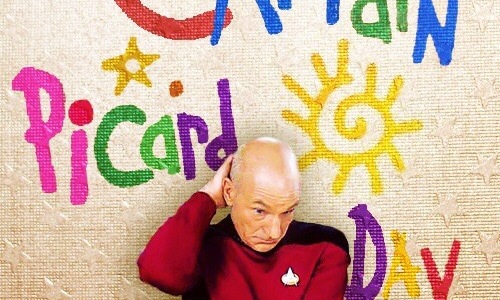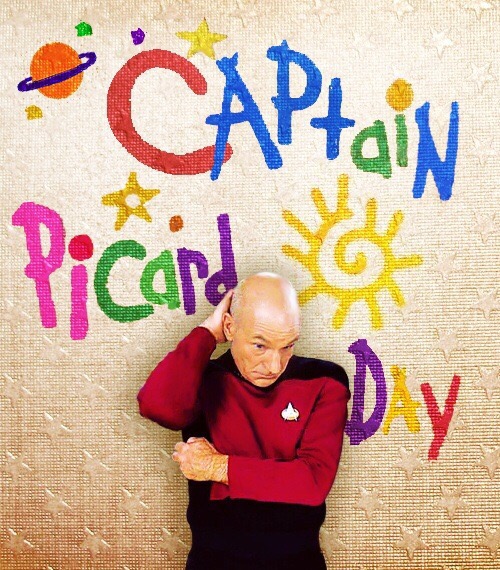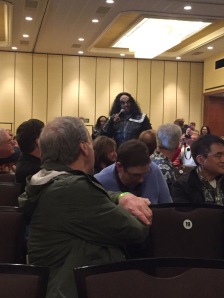Forgive me for taking a little foray back into the world of TNG. I’ve been working on this post for some time, and memorializing the Imzadi relationship has been a goal since day one of this blog.
I’ve been watching Star Trek for as long as I can remember. When the latter seasons of TNG were on the air, my Dad would watch the show on television, and as it was on past my bedtime, we sort of had an unspoken agreement that he would let me watch if I pretended to be asleep. I was still relatively young (TNG ended just a few weeks after my sixth birthday) so my memories of the show are somewhat sparse. However, a few things from my earliest introduction to Star Trek still stick out to me to this day: Worf in a mud bath (Cost of Living), the “scary Data sun episode” (Masks), the one where they turn into animals (Genesis), and Counselor Deanna Troi.
I’ve mentioned before that Troi has some troubling characterization throughout most of the television series. She’s generally presented as a sort of useless eye candy, not even given the dignity of wearing a Star Trek uniform. She was, however, my favorite TNG character as a young girl, and I’ve come to realize now that my earliest memories of Troi are of the Season 6 and 7 Troi who wore a Starfleet uniform and had a place on the bridge. She was one of only two female characters on TNG, and she was certainly the one who spoke to me when I was a child.
My love for Deanna Troi was cemented when she showed up in the movie Star Trek: Insurrection sassy and flirtatious declaring “yuck” when Commander Riker kisses her before getting into a bubble bath with him to shave off that beard. For me, the Imzadi relationship is one of the defining characteristics of my early experience with Star Trek, and on subsequent rewatches, I always eagerly pay attention to the way Jonathan Frakes and Marina Sirtis insert their characters’ relationship into nearly every scene through subtle acting choices.
Anyways, this is really all just a round about way for me to begin a post discussing the Imzadi relationship. I’ve been watching Counselor Deanna Troi and Commander Will Riker interact on screen together for pretty much my entire life, and I’ve been “shipping” them since long before I knew what “shipping” even was. (For those who don’t know, “shipping” is when the fan of a show “ships” two characters and wants them to get together romantically. It is short for relation”ship.”).
They have a lot of chemistry together. This is something I mostly attribute to the fact that the actors portraying the characters are such good friends off screen. Additionally, I tend to think the writers crafted the relationship between these two characters in such a way that it can simmer beneath every scene without needing to be the central focus.
I’ve identified some of the moments that define the Imzadi relationship for me. This isn’t an exhaustive list by any means, and I’m not sure it is even a list of my favorites. But I’d like to think it does encapsulate exactly why these two characters have captured my fascination for the better part of my 28 years on this planet.
The Icarus Factor
By the time The Icarus Factor rolls around in Season 2, the audience already has a pretty good idea of the existence of the Imzadi relationship, but the depth of the current relationship hasn’t really been hashed out. Until this episode, I don’t think we quite understand that the Imzadi relationship isn’t truly in the past for either Troi or Riker. They are not actively in a relationship, of course, but their feelings for each other are not limited to memories of their time together in their youth.
Instead, when faced with Riker’s impending departure from the Enterprise in order to take command of his own ship, we see that they are both reluctant to say goodbye:
Riker: I didn’t want to leave without saying goodbye.
Troi: I don’t like goodbyes. How about: until next time?
Riker: Until next time.
Troi: it’s been a pleasure serving with you, Commander.
Riker: The feeling is mutual, Counselor.
Troi: I’m supported to know how everyone feels, but I can’t read you right now.
Riker: Perhaps your own feelings are getting in the way.
Troi: My job is to help others sort out their emotions. My own feelings are beside the point.
Riker: Not to me. Our feelings are what make us all human.
Troi: Are you feeling sad?
Riker: Yes, I am.
Troi: Me too.
–Star Trek: The Next Generation, The Icarus Factor
I don’t specifically know what it is about this exchange, but it moves me every time. I think it is probably because Riker doesn’t allow it to turn into a professional encounter. He doesn’t care that she is the counselor. He cares about her feelings. And her admission that her own emotions have clouded her ability to sense emotions from others is beautiful.
The Loss
This episode from Season 4 of TNG is one of the first times the show really treats us to all-too-rare true development and focus on Deanna Troi’s character. In this episode, she loses her empathic abilities, and the sudden loss of a sense (which is the equivalent of one of us losing our vision or hearing) is quite jarring for her. She suffers a crisis of confidence. How can she be a counselor if she doesn’t know how to gauge other people’s emotions?
When Troi attempts to turn in her Starfleet resignation to Captain Picard, it is Riker who comes to her quarters to comfort her and, perhaps, talk some sense into her. His first instinct, of course, is to wrap her into a warm embrace and allow her to cry in his arms. One of my favorite Will Riker lines from the entire series comes when she asks him if this is how he solves all his personnel problem, and he dryly responds, “You’d be surprised how far a hug goes with Geordi, or Worf.”
But it isn’t the hug that demonstrates the depth of their relationship. Instead, as she confides in him that she doesn’t know what she should do, Riker doesn’t let her get away with any sort of self pitying:
Troi: I look around me and all I see are surfaces without depth. Colorless; hollow. Nothing seems real.
Riker: I’m real.
Troi: No you’re not. You’re a projection with no more substances to me than a character on the holodeck.
Riker: I don’t believe that.
Troi: You have no idea how frightening it is to just be here without sending you, without sharing your feelings.
Riker: That’s it isn’t it? We’re on equal footing now.
Troi: What?
Riker: You always had an advantage, a little bit of control of every situation. That must have been a very safe position to be in. To be honest, I’d always thought there was something a little too aristocratic about your Betazoid heritage. As if your human side wasn’t quite good enough for you.
Troi: That isn’t true.
Riker: Isn’t it?
—The Loss, Star Trek: The Next Generation
It’s powerful. He doesn’t sugar coat it. And his tone is just as harsh as his words. Riker refuses to let Troi drown in a self-pitying spiral. He isn’t a counselor using therapeutic techniques to help her through her struggles, but he is someone who loves her and knows her deeply.
Tough love is love, and there is plenty of that here. I adore seeing that this relationship is built on more than just unresolved sexual tension smoldering beneath every scene.
Gambit, Part I*
The “tough love” doesn’t just come in one direction. In the early Season 7 episode Gambit, Part I, the audience is treated to the fact that Troi is not afraid to bring Riker’s pettiness to the forefront. Their relationship is built on the mutual respect that allows each of them to take the lead and challenge the other when necessary.
This episode starts off with a “cliffhanger” that would work much better if it didn’t come early in the final season of the series. Captain Picard is “dead,” but I hardly believe anyone in the audience actually fears for the Captain’s life. You don’t kill off the main character with approximately 20 episodes to go.
The crew of the 1701-D, however, does believe their Captain is dead, and it is time to host a memorial service. Troi comes to Riker’s quarters to tell him about the plans for the service, and she requests that he give the eulogy for the Captain. Riker declines because he has no plans to attend the memorial service:
Troi: A memorial service helps to give everyone a sense of completion. Helps them begin the healing process.
Riker: That’s exactly the point. I don’t want to heal.
Troi: Will.
Riker: I’ve got an open wound right here. It hurts like hell. I don’t want it to get better, and I don’t want to pretend that everything’s alright.
Troi: I know you’re angry.
Riker: You’re damn right! And I intend to stay angry until I find whoever’s responsible for the Captain’s death.
Troi: That’s pretty selfish of you. Do you think you’re the only one in pain? Do you think you have the monopoly on loss? Well, let me tell you something: we’re all hurting, and we’re all angry. And whether you like it or not, you have a responsibility to this care, and you can’t just indulge your personal desire for revenge.
Riker: That is enough, Counselor…. Deanna, I’m sorry. This is not about revenge. This is about justice. The Captain died in a bar fight for nothing. Somebody has to answer for that. Then I can mourn.
–Star Trek: The Next Generation, Gambit, Part I
When Riker selfishly refuses to help his crew handle their grief, Troi calls him out on it. She’s right. It is selfish, and his reaction is proof that she has made her point.
Conundrum
I’m sort of ambivalent on the topic of soul mates, but if soul mates do exist, I’d have to think Troi and Riker would be the perfect example. In Season 5‘s episode Conundrum (Which I wrote about here), we see that Troi and Riker have a deep connection even when they’ve been stripped of their memories and identities.
While in Troi’s quarters, she laments that she doesn’t recognize anything in her room. Although it is filled with effects that should be hers, Troi doesn’t recognize anything. She notes that it feels like it belongs to someone else. The only thing even remotely familiar is Riker:
Troi: You seem familiar. You’re the only thing that does.
Riker: Can you remember anything specific about us?
Troi: I don’t know. It’s more like remembering an emotion. Feelings that you’re somehow associated with.
Riker: I hope their good feelings.
Troi: Yes. They are.
–Star Trek: The Next Generation, Conundrum
She’s an empath, of course. So, there is probably some explanation that she’s able to feel subconscious emotions from Riker. But my soulmate supposition might also explain some of it, as well. Their connection is so strong that it’s almost as if Troi recognizes his soul instead of his person.
We’re also treated to a sweet moment (yes, I’m pointedly ignoring the Ro subplot) about the history of their relationship later in the episode when Troi visits Riker who has been trying to uncover his identity. She discovers a book in his quarters:
Troi: Ode to Psyche, John Keats.
Riker: Open it.
Troi: To: Will; All my love, Deanna.
Riker: That may explain some of the familiar feelings we have.
Troi: I don’t know what to think.
–Star Trek: The Next Generation, Conundrum
My mind runs rampant trying to figure out the backstory regarding her choosing to give him that specific book once upon a time.
The Outcast
In the Season 6 episode The Outcast, the friendship between Troi and Riker is on full display. It isn’t a romantic moment, by any stretch of the imagination; the entire episode is devoted to Riker falling in love with a member of an androgynous species.
However, I tend to believe relationships are a little more evolved in the 24th century, and there is certainly something romantic about a love that means you’re simply happy when the other person is happy:
Troi: Has something happened?
Riker:I meant someone. Someone who is becoming very important to me.
Troi: Soren.
Riker: Yes. You’re my friend. I thought–I don’t know–that I should tell you.
Troi: I’m glad you did.
Riker: Nothing will change between us, will it?
Troi: Of course it will. All relationships are constantly changing. But we’ll still be friends, maybe better friends. You’re a part of my life, and I’m a part of yours. That much will always be true.
–Star Trek: The Next Generation, The Outcast
The fact that Riker felt he needed to tell Troi about his relationship before doing anything drastic speaks volumes as to what Troi means to him. The mutual respect and affection is clear even if they aren’t actively engaged in a romantic relationship.
Star Trek: Insurrection
I haven’t made it to the movies on The Prolific Trek, yet, but Insurrection is one of my favorite films of all time. As I noted above, it was this film that cemented my love for Deanna Troi. It’s also a wonderful testament to the relationship Troi and Riker built over the years.
This blog has convinced my friend and fellow writer, Ashley, to begin watching TNG. She has been hesitant at times, and who can blame her? Season 1 of TNG isn’t good, and I freely recognize that my love and appreciation for the show is likely not going to be shared by the general public. But I think she’s enjoying her own trek.
It has been Ashley, and her newfound appreciation for my favorite show, that has really drawn my attention to the Imzadi relationship. I’ve lost count of the number of times she has expressed frustration at their development. It’s a fair question. They obviously love each other. They have great chemistry. The moments I’ve selected on this post barely scratch the surface of the wonderful ones littered throughout the seven seasons.
So, why does it take these crazy kids seven seasons and into a third movie to finally get their act together?
I’m not sure I have a great explanation other than the fact that we have two stubborn, intelligent individuals who let life and responsibility get in the way. Because when influenced by the metaphasic radiation on the Baku planet, they set aside their silly hang ups and do the impossible:
Riker: Counselor, do you think it’s possible for two people to go back in time to fix a mistake they made?
Troi: On this ship? Anything is possible.
—Star Trek: Insurrection
I love this moment. So much.
It is proof that they have loved each other for every moment of the series, but they were, perhaps, too afraid to fix their mistakes. So with the metaphasic radiation releasing their inhibitions and making them a little more youthful, they do what they’ve needed to do since Encounter at Farpoint.
**
I could go on and on. The entire series is filled with these subtle Troi and Riker moments. It is one of the reasons I continue to rewatch TNG above all the other series.
But The Prolific Trek demands I continue on with DS9. I’ll return you to your regularly scheduled programming shortly.
(Of course, if you want to talk TNG or Imzadi, I’m still your girl!)
#LLAP
*Thanks to the wonderful folks over at Trek.FM’s The Babel Conference Facebook group. I never would have come up with the scene from Gambit on my own.





 Riker proves Data is a machine. Photo credit: Memory-Alpha
Riker proves Data is a machine. Photo credit: Memory-Alpha













